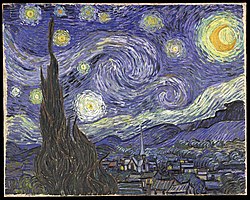Dans le ciel
Dans le ciel ( In Heaven ; That Damned Hand ) is a novel by the French writer Octave Mirbeau , which was published in 1892-1893 as a serial in the newspaper L'Écho de Paris and only in 1989 as a book.
content
In Heaven tells a nested story: a first, anonymous narrator is invited by his friend Georges to visit him on the fantastic mountain top on which he has lived for years. The nameless narrator of the framework now inserts the story of his friend into his own story; in turn, a painter friend, Lucien, has his say. The novel finally ends with him taking his own life. Behind a door, Georges hears his friend's suicide happening, but without seeing it and without being able to prevent it.
The novel appears unfinished and has never been revised by Mirbeau with a view to publication as a coherent narrative. At the time of his writing the author went through a serious crisis: besides difficulties in his marriage, existential worries weighed on him; Beyond that, however, his literary work is also affected insofar as he loses faith in literature as a whole and radically calls into question the prerequisites of the (supposedly) realistic novel. The novel In Heaven is therefore characterized by a strong pessimism that breaks out on three different levels.
First of all, being human is itself and in itself a tragedy: Man is nothing but a grain of dust, lost in infinity; its existence has no meaning or purpose; he is condemned to loneliness, to suffering and to death, and the universe itself is a mere "crime" because everything living comes to death in the end.
Then civil society is demystified on a second level: instead of everyone being able to find their way there and develop freely, everything works to ensure that the individual assimilates, that his individual talents and possibilities are destroyed, and that he ultimately does nothing is more than a "larva". The family, the school and the Catholic Church work together to dehumanize and numb people.
Ultimately, however, those who oppose this bourgeois “warping”, namely the artists, also suffer their own very special tragedy. This is particularly evident in the fate of the painter Lucien, which is modeled on that of Vincent van Gogh : In bourgeois society, in which mere mercantilism reigns, the artist cannot find a place; he is ridiculed and persecuted, and it is with great difficulty that he can make a living from his art. By isolating himself to live “in heaven” (as the unsuccessful writer Georges does on his mountaintop), he condemns himself to ineffectiveness. The art is a torment, ending last fatal.
translation to German
- That damn hand. Translation by Eva Scharenberg. Weidle Verlag, Bonn 2017, ISBN 978-3-938803-84-4 .
Web links
- Octave Mirbeau : Dans le ciel .
- Pierre Michel : "Dans le ciel", ou la tragédie de l'artiste. Preface (PDF; 285 kB).
- Robert Ziegler: The art of verbalizing the barking of a dog: Mirbeau's "Dans le ciel". 2005.
- Pierre Michel : "That damn hand", or an artist's tragedy. Epilogue.
